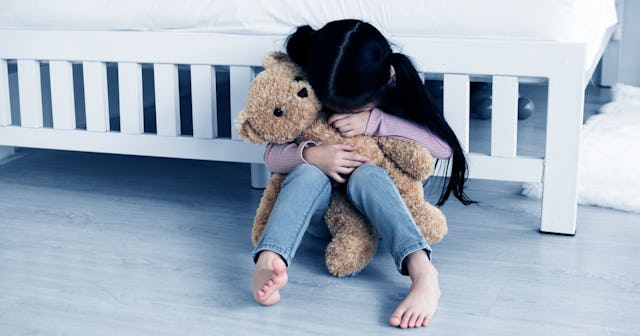My Children Will Always Be Grieving — I Parent Accordingly

My children are grieving. They’ve been grieving for nearly four years. If you count the anticipatory grief, it’s closer to six. Which means I’ve been parenting grieving children for four years, not counting those years when grief had no name and face.
In the earliest days of their grief, the days right after their father, my husband, died, their grief was visceral. It was visible—in tears and tantrums and middle of the night stomach aches.
My parenting adapted to that visceral, visible grief. Every choice—from whether we should go to the diner for breakfast to whether a friend could sleep over—was made with the knowledge that grief was raw and just beneath the surface. When my son acted up, rather than get angry, I hugged him until his big emotions settled. I walked through my daughter’s slammed doors with a quiet voice. I allowed extra desserts and didn’t always insist the playroom got tidied. I knew from a distance it looked as if I was letting them do whatever they wanted without consequences. But that was a choice. I couldn’t discipline a tantrum or a slammed door the way I once might have, because the underlying cause of the tantrum and slammed door had changed. Their grief dictated how I parented.
Over time, their grief has become less visceral, less visible. They’re happy, more than not. They can talk about their dad and their voices don’t shake with tears. But, their grief is there, arising with breathtaking sharpness when least expected. My daughter’s first free writing assignment for English class is an example. She wrote about cancer. More specifically, about her dad’s brain cancer. In her essay, she described moments I was sure she’d forgotten—about times when his anger took over (due to the medication he was on) and times when his frustration crested (because the words in his mind were not the words he was saying.) I read it and my heart broke knowing that grief and those moments still take up space in her mind, her heart. And they always will.
laflor/Getty
As their grief has shifted, so has my parenting. The days of extra desserts at all hours are gone. They have to clean up after themselves and participate in the household. Tantrums and bad choices are talked through and disciplined or not, depending on the incident involved. It’s all very straightforward parenting, similar to pre-grief parenting. Except it’s not like that, at all. Because grief is still there. Deeper beneath the surface, but there. It creeps into certain moments and impacts how they act—or don’t act. As a result, every parenting decision I make is influenced by that layer of grief I know exists.
It means sometimes I say no to situations rife with grief triggers, because it’s my job to protect them. It means sometimes I say yes, and then (try to) teach them how to navigate all the grief triggers, because they need to learn triggers are frequently unavoidable. It means I examine every behavior through a grief-colored lens. Sometimes a tantrum is a tantrum, a mood swing is a mood swing, but I always ask myself whether grief is churning up some of the emotion. Did my son just leave a situation where he was surrounded by his friends and their fathers? Did my daughter have to hear an in-depth recap of the “dad dance” her friends’ fathers performed?
Parenting grieving children means that their grief influences every decision I make, even the minor ones. Their grief is always in the back of my mind.
For some folks, it may look like I’m still coddling my children, making excuse for their bad behavior choices (when they make them). I’m not. They have boundaries. They make plans with friends. They’re children—with a layer of grief at their core. They will always be grieving, which means I will always be parenting grieving children, and my parenting will always reflect that. I’m not the same parent I was in the earliest days of grief, but no longer am I the same parent I was before grief entered into our lives.
The reality is some losses change you—the way you live, eat, sleep, see the world. The grief from those losses has no end point. It transforms with time. Life grows bigger around that grief. But that grief is there, changing the way you live, eat, sleep, see the world. Grief and loss have changed my children’s childhoods permanently. They will never be the kids they once might have been. As a result, it’s changed the way I parent. I will never be the parent that I once might have been.
It’s exhausting, certainly, to parent this way. There’s a lot of second guessing involved. A lot of uncertainty. But there’s also something special about parenting this way. It means that more often than not, I parent intentionally. It means I work hard to be attuned to my children’s emotions. (I can’t always be, but I always try.) It means that my kids (hopefully) always feel heard and protected and are growing up in a home that encourages empathy. Even my pre-grief parenting would have hoped for that.
This article was originally published on